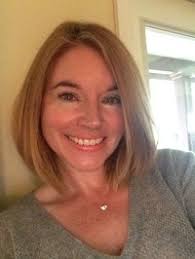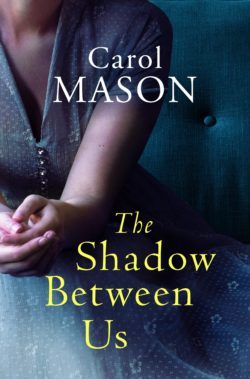Read on for an interview with THE SHADOW BETWEEN US author Carol Mason!
 When did you know writing was for you?
When did you know writing was for you?
In high school. I fell in love with English Literature. It was the only class I looked forward to. I remember how my teacher, Miss Thompson, could have us spending an entire hour dissecting the words of one stanza in a poem. Others might have found it head-banging, but it was filled with so much meaning for me! Then I later worked as a copywriter in advertising and enjoyed the process of finding the right way to convey what you need to get across – I just craved it to be on a more personal level, to be related to something that was truly mine. That’s when I pretty much knew I had to write a book.
Why was The Shadow Between Us a book you wanted to write?
When I first began writing, chick lit was very much in vogue. Humour came naturally to me. I was young – early thirties. Life was light at that time. But then as time went on, a darker, sadder, more deeply powerful story kept nudging at me. It was to do with one of my worst fears and what would happen if I ever had to face it. But would my publisher want it? Did readers want this stuff? Was I brave enough to write it? I think as we get older, life becomes more emotionally layered. We have serious issues to deal with – aging parents, teenagers, tricky spots in marriages, complicated dynamics in friendships etc… All of this stuff brings out shades of our personalities that we might not have previously encountered before and as writers it makes us richer. I finally reached a point where I thought, yes, I can tell this story! I can do it the justice it deserves. And I have to say it was the easiest book for me to write. It’s like I’d subconsciously prepared for my main character, Olivia and the dreadful situation she finds herself in, for most of my adult life!
What is the hardest part of the writing process for you?
Plotting! I have lots of ideas. Admittedly not all of them translate to great novels so you have to just let some of them go. I get excited about ideas! Putting down those first 2 chapters! It’s such a thrill. Knowing what the ending will be… I ALWAYS know how a book will end, even if I don’t know how we will get there. But that’s the problem – the middle 80% of a book! How do you maintain a reader’s interest all that distance? I suppose it’s become easier in time. I have a better sense of pace, timing, tension. That’s critical to telling a story well. I don’t waffle on. I like chapters to be highly pertinent to the story and if anything smells of filler, then I instinctively get rid of it. But knowing your craft only goes so far. A really complex, emotionally resonant story still requires draft after draft for me.
 What are your favorite genres to read?
What are your favorite genres to read?
I read a lot of upmarket women’s fiction, because I think if you are to write it well, you need to keep abreast of what’s out there and be reminded of where the bar is set. I also read psychological thrillers, though, admittedly, there have been SO many of them that I’ve lost some interest. I like stories that are beautifully written but have something profound to say, by characters I’m utterly compelled by.
What do you want readers to take away from your story?
I suspect most readers will relate to this story – perhaps more so than in my other novels. I think the thing I fear most, which is the basis for this story, is probably shared by a lot of readers, so I think they will very much be with my character every step of her journey. I hope, anyway! I suppose what I’d like them to take away from the book is that sometimes we encounter difficult times in life when instead of us being good and kind to ourselves we are often hard on ourselves, and self-punishing. We feel inadequate, we look for ways to blame ourselves, we internalize our pain, we take the fall for others, and it’s an ugly, debilitating concoction. I think this is something women are prone to, more do than men. Perhaps because we are the nurturers and the ones who are always holding everyone else together. But however we deal with things, we have to remember that nothing lasts forever, there is always light ahead – and that we owe it to ourselves to do whatever it takes to get us there.
How important do you think social media is for authors these days?
I think it’s very important. Readers and writers never used to really interact before social media. Now we are all connected and I can honestly say that some of my readers have become my friends, yet we’ve never actually met. I think this is also important because word-of-mouth is increasingly vital to an author’s career nowadays. Now we don’t need to read a newspaper to have our minds made up by ONE CRITIC’s opinion of a novel. We can hear what everybody has to say! And the opinion of that reader is just as valid as that of someone who gets paid to give their review of a book. I must say, I don’t do social media all that well. I’m not the best at self-promotion (embarrassing!) and I find some of it a bit fake or insincere. So I’d rather connect on a personal level, like on Facebook, rather than, say, on Twitter where I feel I’m really just sending messages out into the ether. Plus, as a reader, social media gives me a great glimpse into the life of some authors I admire and I feel I am more connected to their career, and more likely to know when they’ve got a new book out than in days of old!
What would be your advice to aspiring writers?
I have so much advice I could be here all day! I think the main things are, have a very thick skin. If you get advice from someone who is credible (author, agent, editor etc), listen to it, don’t immediately shoot it down if it’s not what you want to hear. Plus, if you encounter rejection and roadblocks, don’t take them personally; try to see your way around them. Always be adaptable. Writing might be a creative endeavour to you, but it’s a business to editors and agents. You need to have a good grasp of that side of things and show that you do. I would also say read as much as you can in the genre you are writing in. Take a critical, close look at your favourite novels and always ask yourself if your own work is on that level, if it’s as brilliant as it can possibly be. Publishing is fiercely competitive. Getting published is hard. Staying published is harder. Then of course never give up. Write with passion or not at all. Don’t be afraid of it taking time. Give it the time it needs. Walk away from it once in a while to give yourself breathing room and new eyes with which to see it. And of course, always believe in yourself.

